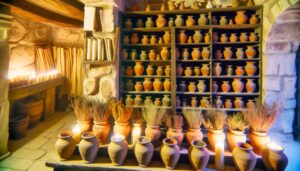Meaning Of Miller In The Bible: Symbolism Explained
In the Bible, millers hold significant importance, symbolizing divine provision and the labor essential to sustaining communities. They are frequently mentioned in scriptural contexts, such as Deuteronomy 24:6 and Matthew 24:41, where their tasks underscore economic stability and sustenance.
The millstones they use represent judgment and the weight of consequences, as illustrated by Jesus’ warning in Matthew 18:6. The transformation of grain into flour by millers mirrors spiritual growth and refinement, serving as an allegory for divine sustenance and care.
Understanding these roles provides deeper insights into the intertwining of physical labor and spiritual meaning within biblical texts.

Meaning of Miller in the Bible: Symbolism and Biblical Context
| Aspect | Description |
|---|---|
| Definition | A miller is one who grinds grain into flour, often using a millstone. |
| Biblical Role | Represented as a vital part of daily life and sustenance in ancient Israel. |
| Symbolism | Labor, provision, judgment, and preparation for spiritual nourishment. |
| Key Scripture | Matthew 24:41 – “Two women will be grinding at the mill…” |
| Spiritual Insight | Reflects the importance of diligence and readiness in God’s kingdom. |
Historical Context of Millers
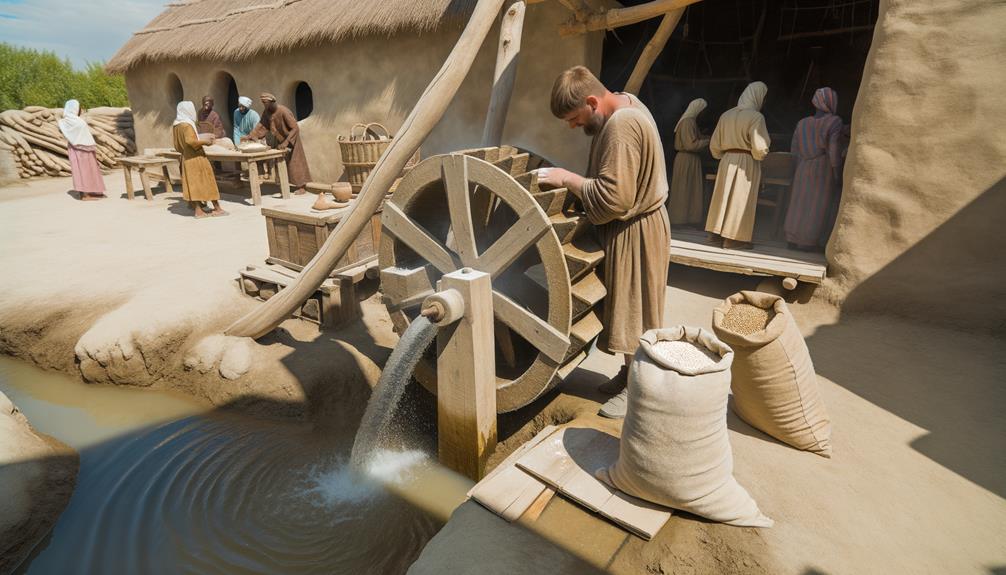
In the historical context of biblical times, millers played an essential role in the agrarian economy, serving as the primary agents responsible for grinding grain into flour. Their function was pivotal in ancient societies where bread constituted a dietary staple.
The process of milling, often performed using hand-operated querns or larger, animal-powered mills, was labor-intensive and required specialized knowledge. Millers, consequently, held a significant position within the community, ensuring a steady supply of flour necessary for daily sustenance.
Theologically, the role of millers can be viewed as a divine provision, facilitating the transformation of raw grain into nourishing food, symbolizing God’s providence and care for His people. The miller’s work underscores the intersection of human labor and divine sustenance in biblical narratives.
Biblical References to Millers
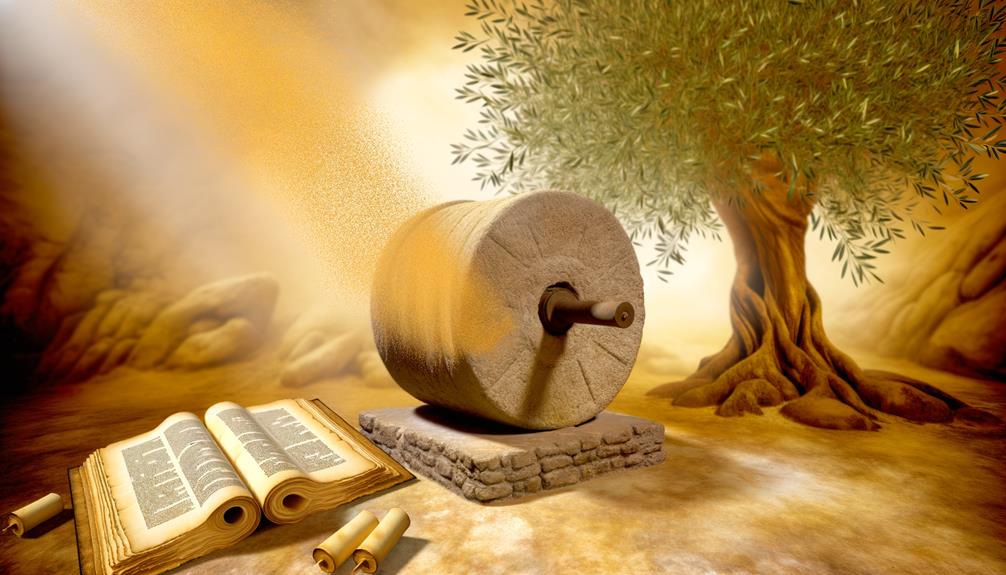
Several passages within the Bible make explicit and implicit references to millers and their work, underscoring their importance in both daily life and symbolic religious contexts.
In Exodus 11:5, the miller is mentioned as part of the broader societal spectrum, illustrating the integral role they played in ancient communities. The millstone, central to a miller’s craft, appears in Matthew 24:41, highlighting the everyday necessity of grinding grain.
Additionally, Deuteronomy 24:6 prohibits taking a millstone as a pledge, recognizing its critical function for sustenance. These references collectively provide insights into the essential nature of millers, reflecting their contribution to both the economic and spiritual fabric of biblical society.
Symbolism of Grain and Flour
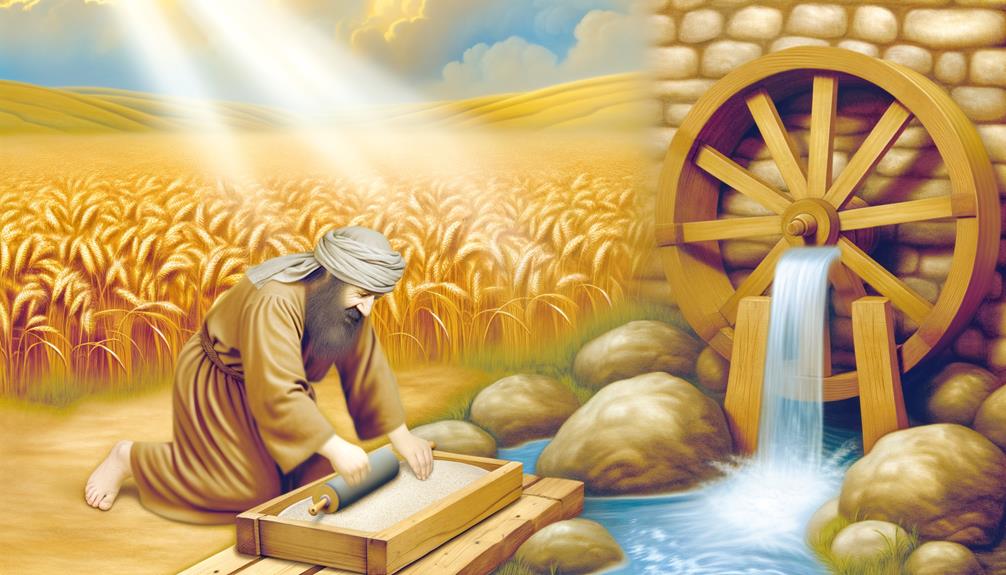
In biblical theology, grain and flour are imbued with profound symbolism, often representing sustenance, provision, and divine blessing.
Grain featured prominently in offerings, signifying gratitude and dependence on God’s providence, while flour was integral to various rituals, highlighting purity and consecration.
Additionally, the cycles of planting, harvesting, and milling underscore themes of renewal, spiritual growth, and the inherent rhythm of divine order in human life.
Grain in Offerings
The symbolic use of grain and flour in biblical offerings underscores the profound theological themes of sustenance, purity, and divine provision.
Within the context of ancient Israelite worship, grain offerings, or ‘minchah,’ represented a crucial connection between the worshiper and God. By presenting the fruits of their labor, individuals acknowledged God’s provision and sovereignty over creation.
The offering of grain, often finely ground into flour, symbolized purity and dedication, reflecting the offerer’s intent to present their best to God. This ritual act served not only as physical sustenance but also as spiritual nourishment, reinforcing the community’s reliance on divine bounty.
Consequently, grain offerings were integral to the covenantal relationship, embodying gratitude and reverence towards the divine.
Flour in Rituals
Examining the role of flour in ancient Israelite rituals reveals its profound symbolism, deeply intertwined with themes of purity, dedication, and divine sustenance. Flour, often used in grain offerings, represented the finest produce of human labor, signifying both human effort and divine provision.
The sacrificial use of flour underscored the holistic relationship between God and His people, where material offerings reflected spiritual devotion.
| Aspect | Symbolism |
|---|---|
| Purity | Refined flour symbolized spiritual cleanliness and moral integrity. |
| Dedication | Offering flour indicated a commitment to God’s covenant and laws. |
| Divine Sustenance | Flour represented God’s provision and the sustenance He provided. |
This intricate symbolism highlights the theological depth of flour in ritual practices, embodying a tangible link between the earthly and the divine.
Symbolic Harvest Cycles
Harvest cycles in ancient Israel held profound theological significance, as they symbolized the cyclical nature of divine provision and human reliance on God’s continued blessings.
Grain and flour, essential staples, were not merely agricultural products but carried rich symbolic weight. The sowing, growth, and harvesting of grain paralleled spiritual renewal, divine judgment, and reward. Flour, often used in offerings, represented purity and dedication to God.
These cycles underscored the Israelites’ dependence on divine favor for sustenance and prosperity. Festivals like the Feast of Weeks (Shavuot) celebrated the first fruits, reinforcing the connection between agricultural success and divine benevolence.
Through these symbolic harvest cycles, the Biblical narrative emphasized gratitude, stewardship, and the perpetual covenant between God and His people.
Millers in Daily Life

In biblical times, the miller played a vital role in daily life, operating within a framework of traditional milling practices that were integral to the sustenance of the community.
The miller’s work not only provided essential flour for bread, a staple food, but also held considerable economic significance, often serving as a hub for local trade and social interaction.
Understanding the miller’s vocation within this context offers deeper theological insights into the biblical narratives that underscore themes of provision, labor, and communal interdependence.
Traditional Milling Practices
Rooted in the agrarian context of biblical times, traditional milling practices played a vital role in daily life, underscoring the miller’s essential function in transforming harvested grain into usable flour for sustenance. This process was foundational to the community’s survival, reflecting a divinely ordained order of provision.
Theologically, milling can be seen as a metaphor for spiritual transformation, turning the raw material of human experience into spiritual nourishment. Key elements of traditional milling practices include:
- Hand-operated millstones: Simple, labor-intensive tools symbolizing human effort and divine reliance.
- Watermills and windmills: Technological advancements reflecting God’s wisdom in creation.
Each practice encapsulates a blend of physical necessity and spiritual significance.
Role in Community
The miller’s role extended beyond mere craftsmanship, becoming a pivotal figure in the daily life of the biblical community by ensuring a steady supply of flour, which was indispensable for sustenance and social stability.
Flour was a fundamental component of daily bread, a staple in both ordinary meals and religious offerings. Theologically, the miller’s work symbolized divine provision and the sustenance God provided to His people.
Contextually, millers were integral to the agrarian society, linking agricultural production with daily nourishment. Their presence was essential in maintaining the rhythm of communal life, as they transformed raw grain into usable food.
Consequently, the miller served not just as a tradesperson, but as a linchpin in the spiritual and social fabric of biblical times.
Economic Significance
Amidst the socio-economic landscape of biblical times, millers played an essential role in the marketplace, greatly influencing local economies through their control over the production and distribution of flour. Their work was pivotal in sustaining daily life, as flour was a staple commodity.
The economic significance of millers can be understood through several key aspects:
- Market Stability: Millers guaranteed a consistent supply of flour, stabilizing food markets and prices.
- Employment: The milling industry provided jobs, supporting local families and communities.
Theologically, millers’ roles can be seen as divinely ordained, reflecting God’s provision through human labor and contributing to the sustenance of His people.
Millers and Divine Provision

In examining the role of millers in the context of divine provision, it is essential to understand how their labor symbolizes God’s sustenance and care for His people throughout biblical narratives.
Millers, responsible for grinding grain into flour, play a significant role in the sustenance of communities, reflecting the divine promise of provision.
Biblically, this act of transforming raw resources into nourishment parallels God’s provision of manna to the Israelites (Exodus 16).
The labor of millers consequently embodies a tangible manifestation of divine care, ensuring that the needs of the community are met.
This theological perspective underscores the importance of human cooperation with divine providence, illustrating how God’s blessings are often mediated through everyday labor and industry.
Millers in Parables
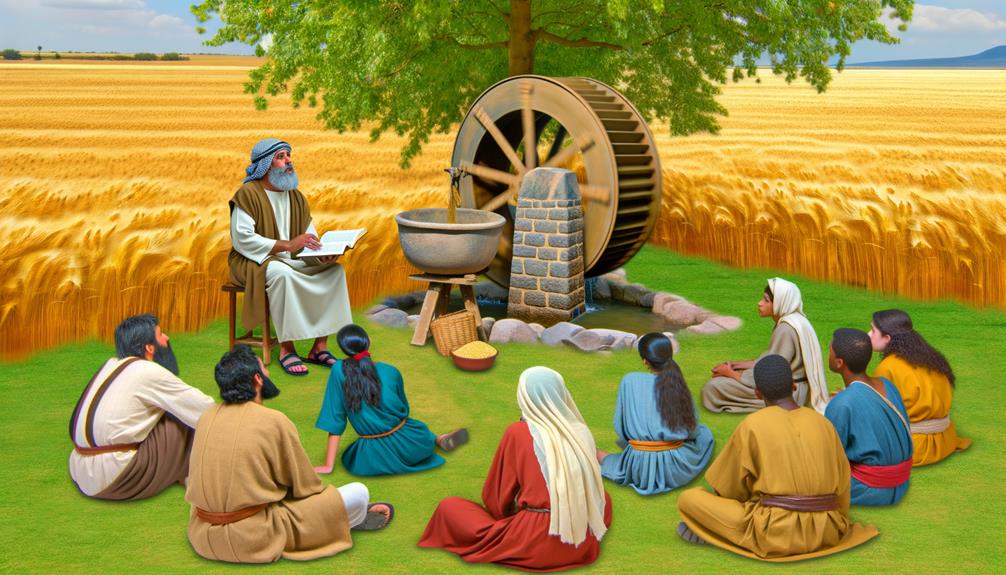
How do millers in biblical parables illustrate deeper theological themes of transformation, divine justice, and communal interdependence?
Millers, who transform grain into usable flour, symbolize spiritual transformation, reflecting the journey from raw humanity to refined spirituality. Their role often underscores divine justice, as the process of grinding can represent the inevitable judgment and separation of good from evil.
- Transformation: The miller’s work mirrors spiritual refinement.
- Divine Justice: Grinding grain symbolizes the process of divine judgment.
In this way, millers in parables serve as potent symbols of broader theological principles, intertwining everyday labor with divine purpose and moral lessons.
Role in Spiritual Metaphors
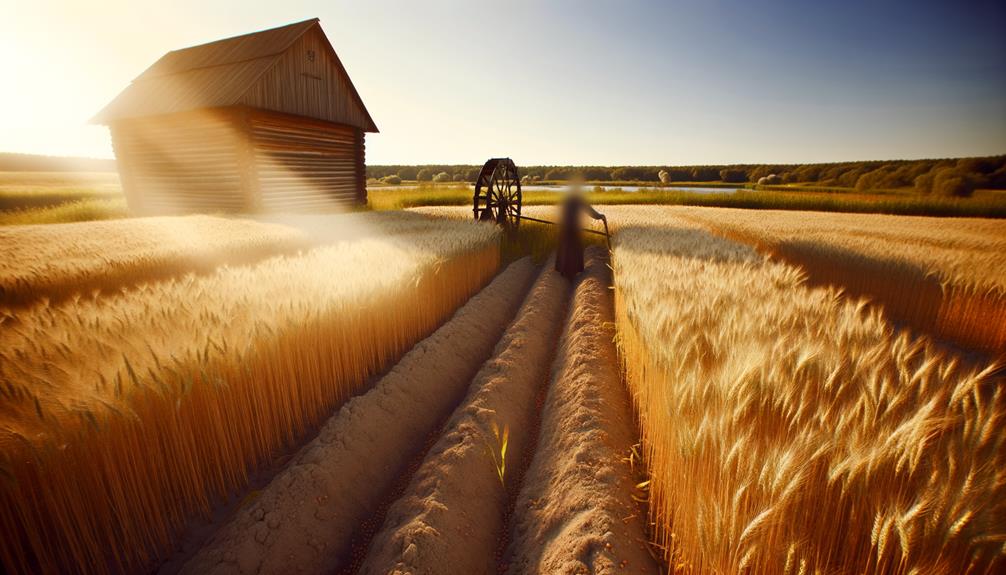
In biblical spiritual metaphors, the miller’s role in grinding wheat symbolizes the transformative process essential for spiritual growth and refinement.
This act of converting raw grain into flour can be viewed as an allegory for the provision of spiritual nourishment, where the miller represents those who facilitate the dissemination of divine wisdom and sustenance.
Through this lens, the miller’s labor underscores the critical function of spiritual leaders in nurturing and sustaining the faith community.
Symbolic Wheat Grinding
Symbolic wheat grinding in biblical contexts often represents the transformative process of spiritual purification and divine provision. This metaphorical practice underscores the significant themes of transformation and sustenance within the scriptural narrative.
Wheat grinding not only symbolizes the refinement of raw materials into something nourishing but also parallels the spiritual journey of believers undergoing sanctification.
Key themes associated with symbolic wheat grinding include:
- Purification: The process of grinding wheat purifies the grain, analogous to the spiritual purification of individuals.
- Transformation: Transforming wheat into flour represents the believer’s journey from a state of sin to redemption.
This metaphor serves as a profound illustration of intricate divine processes.
Spiritual Nourishment Provider
Serving as a spiritual nourishment provider, the miller in biblical metaphors often embodies the divine role of sustaining and enriching the believer’s soul through transformative spiritual practices.
Just as the miller grinds wheat into flour, essential for daily sustenance, so too does the divine process shape and refine human character, making spiritual truths accessible and nourishing. This metaphor underscores the importance of divine intervention in the continuous cultivation of faith and wisdom.
Within this context, spiritual nourishment is not merely about survival but about thriving through divine guidance, akin to how finely ground flour produces sustenance from raw grain.
Consequently, the miller symbolizes a conduit through which God’s teachings are processed and provided, sustaining the spiritual growth of the faithful.
Millstones in Scripture

Biblical references to millstones often highlight their significance in daily life and their symbolic representation of judgment and burden. In ancient times, millstones were essential for grinding grain, making them fundamental to sustenance and economic stability. Theologically, millstones appear in scripture to signify heavy consequences and divine judgment.
- Symbol of Judgment: Jesus warns of severe repercussions for leading others astray, likening it to having a millstone hung around one’s neck (Matthew 18:6).
- Burden and Labor: Millstones also symbolize the heavy labor and burdens of life, as seen in the lamentations of the exiled Israelites (Lamentations 5:13).
- Destruction and Finality: In Revelation 18:21, a millstone thrown into the sea signifies the irreversible destruction of Babylon.
These scriptural references enrich our understanding of millstones beyond their practical use.
Millers and Community
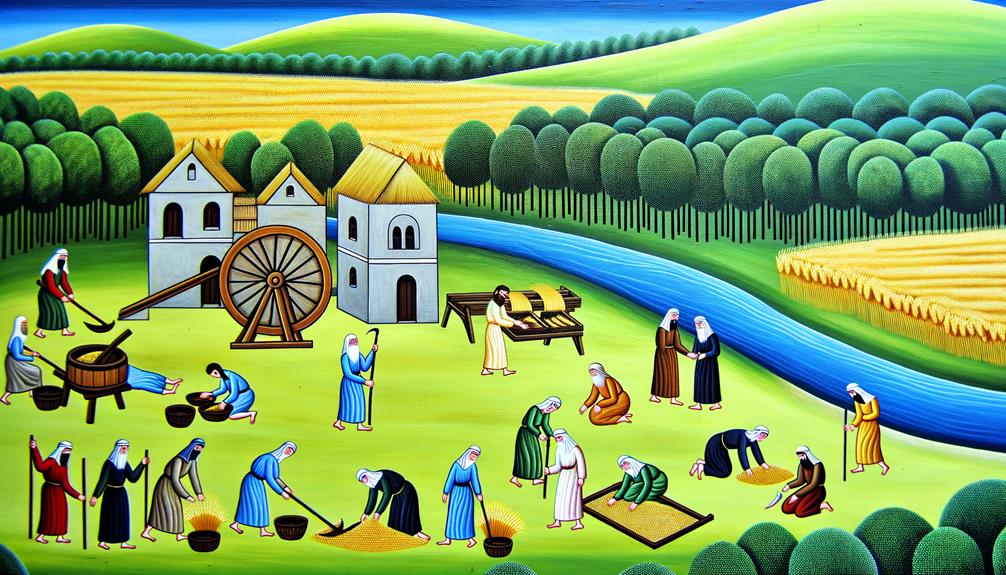
In the context of ancient biblical communities, millers held a pivotal role, both economically and socially, as they were responsible for the essential task of grinding grain into flour. This function was critical for sustenance, given that bread was a staple in the diet.
The miller’s work was often a communal activity, requiring collaboration and trust within the community. Theologically, the miller’s role can be seen as a metaphor for spiritual nourishment, as grain transformed into flour symbolizes the conversion of divine blessings into daily sustenance.
Additionally, millers often served as gatekeepers of resource distribution, highlighting their importance in maintaining social cohesion and ensuring communal welfare. Their presence underscores the interconnectedness of physical sustenance and spiritual well-being.
Lessons From the Miller’s Work
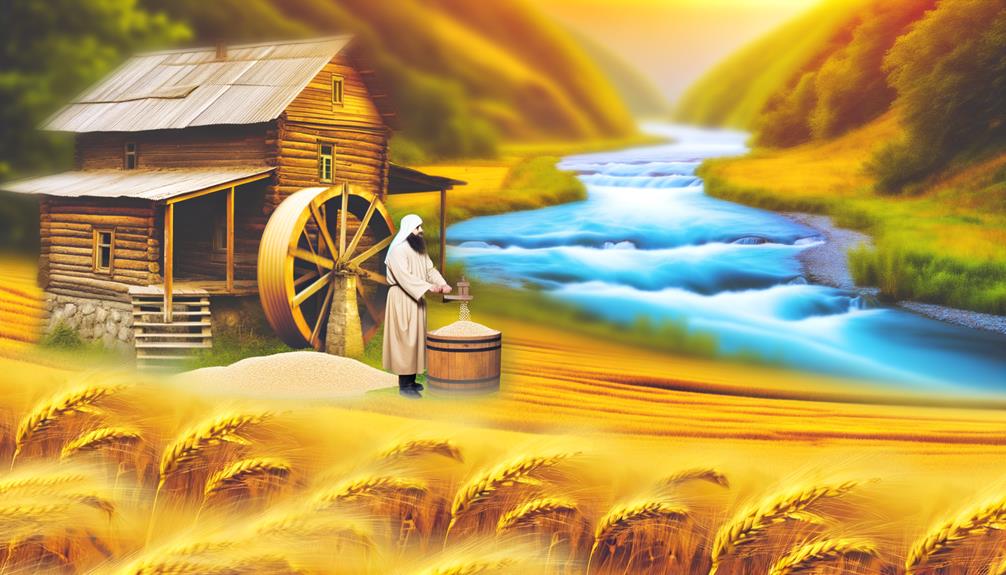
The miller’s integral role in ancient biblical societies offers profound theological and practical lessons that extend beyond their immediate economic and social contributions. Their labor in transforming raw grain into sustenance mirrors the spiritual transformation that believers undergo.
Additionally, the miller’s work underscores the importance of diligence and stewardship, as they meticulously convert God’s provision into nourishment for the community.
- Transformation: The process of milling grain symbolizes spiritual refinement and growth.
- Stewardship: Millers exemplify responsible management of resources, reflecting biblical principles.
These lessons invite believers to reflect on their own roles in both spiritual and communal contexts, enhancing their understanding of biblical principles.
Conclusion
The role of millers in biblical times, as examined through historical, theological, and symbolic lenses, reveals their integral place in both daily life and spiritual teachings.
Millers, through their work with grain and flour, symbolize divine provision and community sustenance.
The millstone, an enduring biblical metaphor, underscores the profound significance of transformation.
Understanding the miller’s multifaceted role offers inexhaustible insights into the interconnectedness of labor, faith, and divine grace within the biblical narrative.




